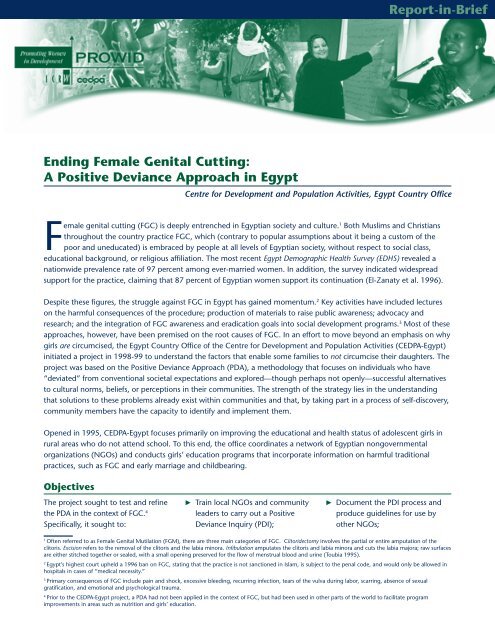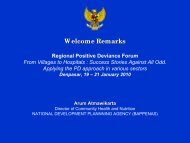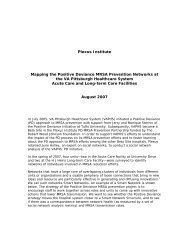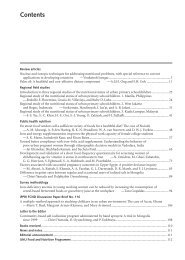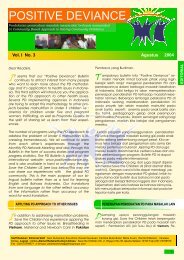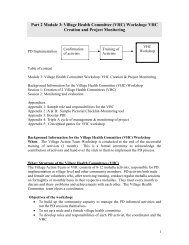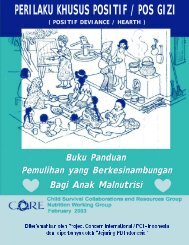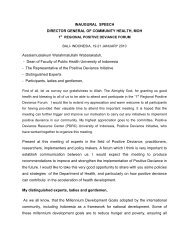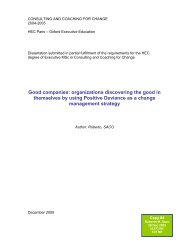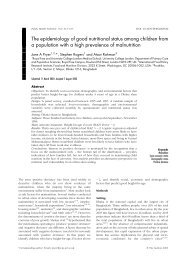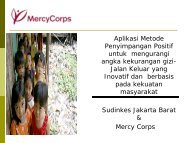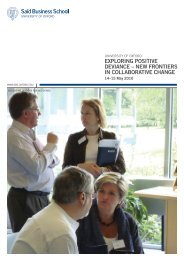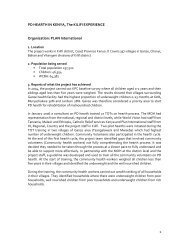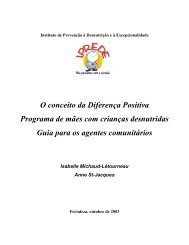Ending Female Genital Cutting - Positive Deviance Initiative
Ending Female Genital Cutting - Positive Deviance Initiative
Ending Female Genital Cutting - Positive Deviance Initiative
You also want an ePaper? Increase the reach of your titles
YUMPU automatically turns print PDFs into web optimized ePapers that Google loves.
Report-in-Brief<br />
<strong>Ending</strong> <strong>Female</strong> <strong>Genital</strong> <strong>Cutting</strong>:<br />
A <strong>Positive</strong> <strong>Deviance</strong> Approach in Egypt<br />
Centre for Development and Population Activities, Egypt Country Office<br />
<strong>Female</strong> genital cutting (FGC) is deeply entrenched in Egyptian society and culture. 1 Both Muslims and Christians<br />
throughout the country practice FGC, which (contrary to popular assumptions about it being a custom of the<br />
poor and uneducated) is embraced by people at all levels of Egyptian society, without respect to social class,<br />
educational background, or religious affiliation. The most recent Egypt Demographic Health Survey (EDHS) revealed a<br />
nationwide prevalence rate of 97 percent among ever-married women. In addition, the survey indicated widespread<br />
support for the practice, claiming that 87 percent of Egyptian women support its continuation (El-Zanaty et al. 1996).<br />
Despite these figures, the struggle against FGC in Egypt has gained momentum. 2 Key activities have included lectures<br />
on the harmful consequences of the procedure; production of materials to raise public awareness; advocacy and<br />
research; and the integration of FGC awareness and eradication goals into social development programs. 3 Most of these<br />
approaches, however, have been premised on the root causes of FGC. In an effort to move beyond an emphasis on why<br />
girls are circumcised, the Egypt Country Office of the Centre for Development and Population Activities (CEDPA-Egypt)<br />
initiated a project in 1998-99 to understand the factors that enable some families to not circumcise their daughters. The<br />
project was based on the <strong>Positive</strong> <strong>Deviance</strong> Approach (PDA), a methodology that focuses on individuals who have<br />
“deviated” from conventional societal expectations and explored—though perhaps not openly—successful alternatives<br />
to cultural norms, beliefs, or perceptions in their communities. The strength of the strategy lies in the understanding<br />
that solutions to these problems already exist within communities and that, by taking part in a process of self-discovery,<br />
community members have the capacity to identify and implement them.<br />
Opened in 1995, CEDPA-Egypt focuses primarily on improving the educational and health status of adolescent girls in<br />
rural areas who do not attend school. To this end, the office coordinates a network of Egyptian nongovernmental<br />
organizations (NGOs) and conducts girls’ education programs that incorporate information on harmful traditional<br />
practices, such as FGC and early marriage and childbearing.<br />
Objectives<br />
The project sought to test and refine<br />
the PDA in the context of FGC. 4<br />
Specifically, it sought to:<br />
Train local NGOs and community<br />
leaders to carry out a <strong>Positive</strong><br />
<strong>Deviance</strong> Inquiry (PDI);<br />
Document the PDI process and<br />
produce guidelines for use by<br />
other NGOs;<br />
1<br />
Often referred to as <strong>Female</strong> <strong>Genital</strong> Mutilation (FGM), there are three main categories of FGC. Clitoridectomy involves the partial or entire amputation of the<br />
clitoris. Excision refers to the removal of the clitoris and the labia minora. Infibulation amputates the clitoris and labia minora and cuts the labia majora; raw surfaces<br />
are either stitched together or sealed, with a small opening preserved for the flow of menstrual blood and urine (Toubia 1995).<br />
2<br />
Egypt’s highest court upheld a 1996 ban on FGC, stating that the practice is not sanctioned in Islam, is subject to the penal code, and would only be allowed in<br />
hospitals in cases of “medical necessity.”<br />
3<br />
Primary consequences of FGC include pain and shock, excessive bleeding, recurring infection, tears of the vulva during labor, scarring, absence of sexual<br />
gratification, and emotional and psychological trauma.<br />
4<br />
Prior to the CEDPA-Egypt project, a PDA had not been applied in the context of FGC, but had been used in other parts of the world to facilitate program<br />
improvements in areas such as nutrition and girls’ education.
PROWID<br />
Foster community awareness of<br />
and activism on FGC;<br />
The Intervention<br />
Enable local NGOs and communities<br />
to identify and develop effective<br />
strategies to eradicate the practice<br />
of FGC in their communities;<br />
“This is my first time to know<br />
that there are people who not<br />
only talk about FGM but also<br />
stand against it. I always kept<br />
the thinking on FGM to myself<br />
and I feel a lot relieved by<br />
attending this workshop.” 5<br />
The project was designed to facilitate<br />
discussions about FGC among<br />
local NGOs, community groups,<br />
and individuals in an environment<br />
of mutual trust and respect. The<br />
process was characterized by three<br />
distinct phases:<br />
Preparation<br />
Through individual contacts and<br />
meetings with local NGOs, nine<br />
individuals were identified as<br />
<strong>Positive</strong> Deviants (PDs) by the<br />
CEDPA-Egypt staff. 6 In order to<br />
implement a PDI, partnerships were<br />
arranged with four organizations:<br />
The Coptic Organization for Services<br />
and Training (COST) and the NGO<br />
Monshaat Nasser, both in Beni Suef;<br />
the Center for Women’s Legal<br />
Assistance (CEWLA) in Cairo; and<br />
Caritas in Minya. 7 These NGOs<br />
represent rural, urban, Christian,<br />
and Muslim populations with<br />
diverse educational levels, and<br />
conduct activities in such areas as<br />
literacy, skills training, health and<br />
family planning, legal aid, and<br />
substance abuse.<br />
Implementation<br />
Community leaders and staff from<br />
the four NGOs participated in threeday<br />
orientation workshops. The<br />
orientation had four objectives:<br />
review FGC practices and past efforts<br />
to address the issue in the selected<br />
communities; present an overview<br />
of the PDI process to participants;<br />
emphasize the purpose and potential<br />
of learning from PDs; and<br />
conduct interviews with the nine<br />
identified PDs.<br />
In addition, skills training conducted<br />
during the workshop focused on<br />
effective and sensitive communication<br />
and how to create a climate of<br />
trust between a PD and an interviewer.<br />
8 In addition, participants<br />
<br />
<br />
<br />
<br />
<br />
<br />
<br />
were able to practice interview and<br />
information recording techniques,<br />
which were then carried out by<br />
NGOs in conjunction with respective<br />
community leaders. Interview<br />
questions were developed to elicit<br />
information on various aspects of<br />
FGC, as indicated in the box below.<br />
Analysis and Looking Ahead<br />
After the PD interviews were conducted,<br />
community leaders and staff<br />
from CEDPA-Egypt and the NGOs<br />
reconvened at a two-day workshop<br />
to analyze the information recorded.<br />
This analysis—and, more importantly,<br />
the words, images and<br />
messages that were distilled from<br />
the interviews—became the foundation<br />
for proposed strategies and<br />
activities that are being implemented<br />
to end FGC in participating<br />
communities.<br />
What is the PD’s opinion of FGC? Personal experiences with FGC?<br />
What are the reasons, events, or turning points that led the PD to reject FGC?<br />
Did the PD’s decision to stop the practice create tension within her/his family<br />
and, if so, how did the PD deal with the difficulties encountered?<br />
What advice on FGC would the PD give to family or friends?<br />
What are the PD’s ideas for community-based strategies to end FGC?<br />
Does the PD believe that he or she can play a role in the struggle against FGC in<br />
Egypt? If so, what would that role be?<br />
Is the PD aware of other community members who are not practicing FGC?<br />
Would she or he introduce them to the interviewer or other NGO staff?<br />
Results<br />
The use of the PDA in the context of<br />
FGC produced some extraordinary<br />
results that were both hoped for and<br />
unexpected:<br />
Training and Documentation<br />
Through its work with the four<br />
NGOs, CEDPA-Egypt trained a total<br />
of 31 women and 13 men in the PDI<br />
process, which was closely documented.<br />
In addition, a PDI guidebook<br />
was produced for use by other<br />
organizations seeking to train<br />
5<br />
All quotes are from interviews with <strong>Positive</strong> Deviants (PDs) and/or PDA project participants.<br />
6<br />
<strong>Positive</strong> Deviants (PDs) may be: (1) individuals who have prevented the cutting of young girls, e.g., mothers, fathers, older sisters, and grandmothers; (2)<br />
individuals who have stopped performing the cutting, e.g., traditional birth attendants, circumcisers, or doctors; or (3) community leaders who oppose FGC, e.g.,<br />
religious leaders, teachers, or other officials. In conducting the PDI in Egypt, the term “<strong>Positive</strong> Role Model” was used instead of <strong>Positive</strong> Deviant because PD did<br />
not translate well into Arabic; however, for the purposes of this brief, the term <strong>Positive</strong> Deviant will be used.<br />
7<br />
The PDI was piloted in collaboration with COST, the staff of which greatly facilitated work with other NGOs by sharing their experiences and lessons learned.<br />
8<br />
Communication for Change (C4C), based in New York, was instrumental in developing the interview protocol and introducing the use of video into the PDA.<br />
2
Report-in-Brief<br />
individuals to do similar work in their<br />
communities. As an indication of the<br />
reach and success of the project, 83<br />
PDs have to date been identified and<br />
interviewed in local communities.<br />
Awareness and Activism<br />
Both the PDs and project participants<br />
from the NGOs reported that the PDI<br />
process had enhanced their awareness<br />
of FGC. Despite the fact that<br />
discussing FGC openly and freely<br />
remains challenging in Egyptian<br />
society, the PDI served to break<br />
traditional silence. For example, for<br />
the first time, a young woman shared<br />
her “secret” of being uncircumcised<br />
with people outside her own family<br />
and an unmarried female community<br />
worker openly discussed FGC with<br />
her male colleagues. Also for the first<br />
time, not a single girl was circumcised<br />
during the traditional season for<br />
FGC in two villages where the PDI<br />
was conducted, in large part due to<br />
awareness generated by the project.<br />
“Although I prevented the<br />
circumcision of my three younger<br />
daughters after doing it for my<br />
eldest, I never imagined that I<br />
would be dar[ing] enough to<br />
announce that in front of others.”<br />
On their own initiative, many project<br />
participants began discussions on<br />
FGC in their communities and with<br />
family members and friends, opening<br />
up a subject that was once taboo. For<br />
example, following an interview, an<br />
unmarried, 18 year-old PD successfully<br />
convinced her parents to not<br />
circumcise her younger sister. She<br />
also hosted a meeting with 15 of her<br />
circumcised friends, during which<br />
each of the young women related her<br />
own traumatic experience with FGC<br />
and pledged to discuss the issue with<br />
their parents in order to “save” their<br />
younger sisters.<br />
New Strategies<br />
Analysis of the PD<br />
interviews indicated<br />
that the emotional and<br />
psychological trauma<br />
associated with FGC is<br />
the most influential<br />
factor that led the<br />
individuals interviewed<br />
to reject the practice.<br />
By better understanding<br />
the reasons why<br />
PDs did not circumcise<br />
their daughters or<br />
disagreed with the<br />
practice of FGC, NGO<br />
staff and community<br />
members were able to<br />
design more effective ways of<br />
combating FGC in their communities.<br />
One proposed strategy was education<br />
and awareness campaigns<br />
targeted at the people who influence<br />
FGC decisionmaking, such as young<br />
men, doctors, religious leaders, and<br />
older women. Findings gleaned from<br />
the interviews could also be incorporated<br />
into information, education,<br />
and communication materials and<br />
other behavior-change media, while<br />
the concept of positive role models<br />
could become part of communitybased<br />
advocacy activities. An<br />
additional strategy could be the<br />
continuing identification and<br />
interviewing of PDs in the four<br />
communities and the introduction of<br />
the PDA in other areas.<br />
Capacity Building<br />
As a research tool and as a process,<br />
the PDA enhanced the capacity of<br />
the NGOs and community leaders in<br />
significant ways. First, the PDA is a<br />
generic and versatile methodology<br />
that can be readily adapted to<br />
address other development challenges<br />
that exist in communities.<br />
CEDPA-Egypt staff member (left) listens to testimony of former<br />
daya (circumciser) from Beni Suef (middle)<br />
Second, the process yielded the<br />
important and unanticipated result<br />
of strengthening and redefining the<br />
relationship between the community<br />
and the NGOs. Three of the four<br />
participating organizations reported<br />
that the PDI provided the first<br />
opportunity for community leaders<br />
and staff to discuss issues and design<br />
development strategies as equal<br />
partners, creating relationships built<br />
on trust, respect, and reciprocity.<br />
Conclusions<br />
CEDPA-Egypt’s FGC project was an<br />
experiment that exceeded expectations.<br />
While staff members assumed<br />
that PDs existed and could be<br />
identified, they were not certain that<br />
this group would be willing to be<br />
interviewed or to work within their<br />
communities to end FGC. By<br />
involving communities directly, the<br />
PDI process reaffirmed the development<br />
principles of sustainability and<br />
ownership. Most importantly,<br />
however, the PDI process demonstrated<br />
for a fact that positive role<br />
models already exist and can serve<br />
as advocates and strategists for the<br />
elimination of FGC.<br />
3
PROWID<br />
Recommendations and Lessons Learned<br />
The PDA is a promising methodology<br />
for FGC elimination in other<br />
communities and countries. Key<br />
recommendations include:<br />
Prepare for the interview.<br />
Because the PD interview is such a<br />
critical factor in the success of the<br />
project, adequate time should be<br />
devoted to preparation and practice.<br />
A solid foundation in communication<br />
techniques that facilitate sharing,<br />
provide support, and pose probing<br />
questions in a sensitive manner is<br />
necessary to elicit the richest<br />
interview results (for example,<br />
videotaping participants practicing<br />
interviews is an effective method for<br />
evaluating techniques and providing<br />
constructive feedback). Further, an<br />
interview team should be comprised<br />
of a staff person and a local community<br />
member in order to strengthen<br />
the working relationship between<br />
NGOs and communities, as well as<br />
to provide a safer environment in<br />
which PDs can share information.<br />
Finally, the interview should take<br />
place in private, without family<br />
members or other distractions.<br />
Replicate and evaluate. Results<br />
from the pilot project have inspired<br />
new strategies to combat FGC, as<br />
well as enthusiasm and optimism<br />
among both communities and local<br />
development organizations. However,<br />
before the PDA can be defined<br />
as a model in any one country or<br />
culture, the experimental process<br />
must be replicated in numerous<br />
communities in order to measure its<br />
effect. 9 Efforts should also be made<br />
to systematically evaluate its longterm<br />
impact on the practice of and<br />
policies on FGC.<br />
An important lesson was learned<br />
from the project that can guide<br />
future efforts:<br />
Local knowledge is an enormous<br />
resource. The “discovery” of<br />
PDs was an eye-opening experience.<br />
Many project participants had<br />
doubted that PDs even existed,<br />
while others could not see how PDs<br />
could play useful roles. By the end of<br />
the interview process, however,<br />
interviewers admitted that most of<br />
the PDs were better informed about<br />
the physical and sociocultural issues<br />
surrounding FGC than they were. In<br />
fact, prior to renouncing FGC, many<br />
of the PDs had sought the counsel of<br />
doctors and religious leaders to<br />
confirm their belief that the practice<br />
is harmful and unnecessary. The<br />
advocacy potential of the PDs also<br />
became clear as they requested<br />
further discussions with NGO staff<br />
and began to encourage others to<br />
make the “right” decision and<br />
abandon FGC.<br />
References<br />
El-Zanaty, Fatma, Enas Hussein, Gihan Shawky et al. 1996.<br />
Egypt Demographic and Health Survey 1995. National Population Council (Egypt) and Macro International, Inc. Calverton, Maryland.<br />
Toubia, Nahid. 1995.<br />
<strong>Female</strong> <strong>Genital</strong> Mutilation: A Call for Global Action. Research, Action and Information Network for Bodily Integrity of Women (RAINBO). New<br />
York.<br />
9<br />
The USAID Office of Population, Health and Nutrition has granted funding for CEPDA-Egypt to expand the PDI to new communities and to more closely evaluate<br />
the project’s short-term impact.<br />
International Center for Research<br />
on Women<br />
1717 Massachusetts Avenue, NW, Suite 302<br />
Washington, DC 20036, USA<br />
Tel: (202) 797-0007; Fax: (202) 797-0020<br />
www.icrw.org<br />
The Centre for Development and<br />
Population Activities<br />
1400 16th St., NW<br />
Washington, DC 20036, USA<br />
Tel: (202) 667-1142; Fax: (202) 332-4496<br />
www.cedpa.org<br />
Information for this brief was taken from:<br />
CEDPA-Egypt. 1999. “The <strong>Positive</strong> <strong>Deviance</strong> Approach in <strong>Female</strong> <strong>Genital</strong> Mutilation<br />
Eradication.” Final end-of-project report for PROWID to the Centre for Development<br />
and Population Activities.<br />
For additional information and project-related documents, please contact:<br />
Ms. Pamela McCloud<br />
Country Director, CEDPA<br />
53 Manial Street, Suite 500<br />
Manial El Rodah, Cairo 11451, Egypt<br />
Tel: 2-02-365-4567; Fax: 2-02-365-4568<br />
Email: Cedpa@intouch.com<br />
The publication of this report is made possible through the Promoting Women in Development (PROWID) program, funded by the Office of Women<br />
in Development at the United States Agency for International Development (USAID) under the terms of Cooperative Agreement No. FAO-A-00-95-<br />
00030-00. The opinions expressed herein do not necessarily reflect the views of USAID, ICRW, or CEDPA.<br />
Copyright© 1999 International Center for Research on Women and The Centre for Development and Population Activities<br />
4


